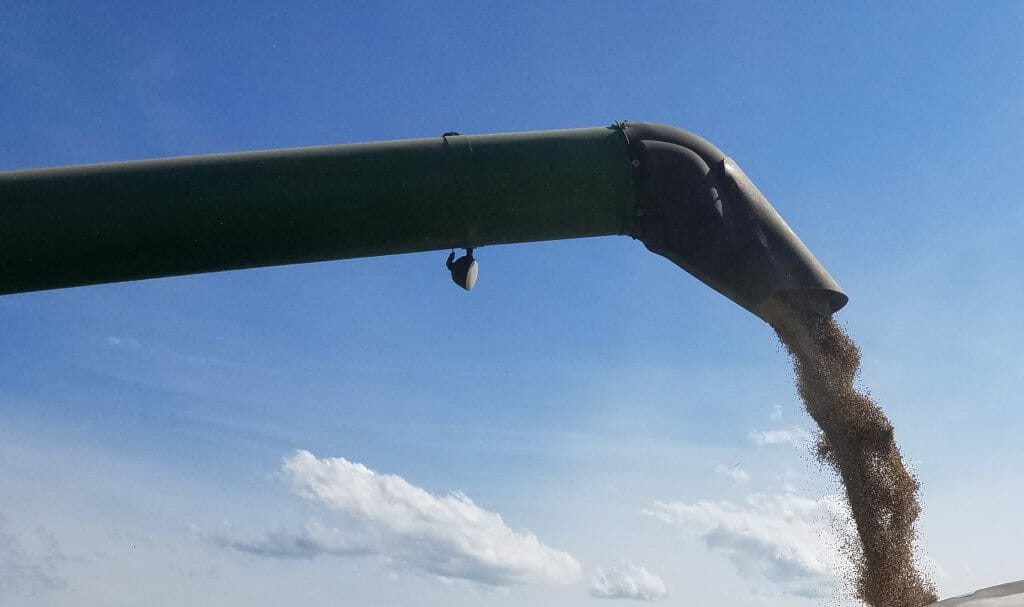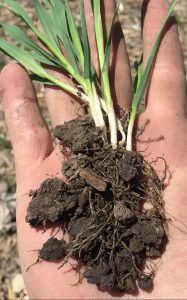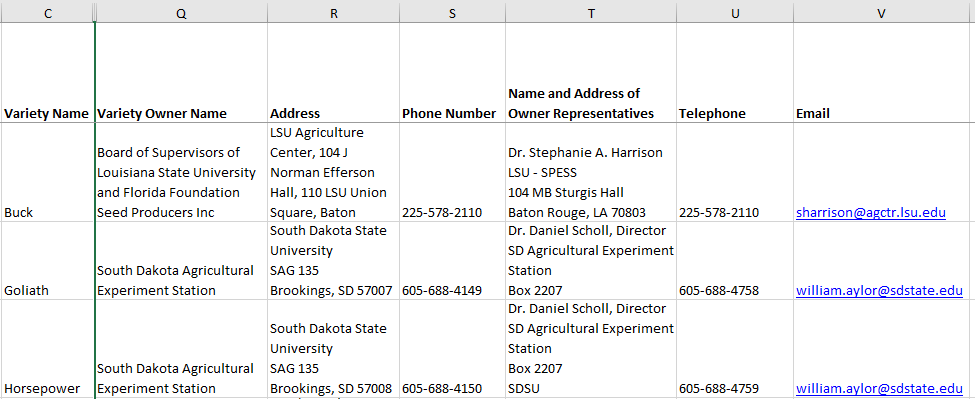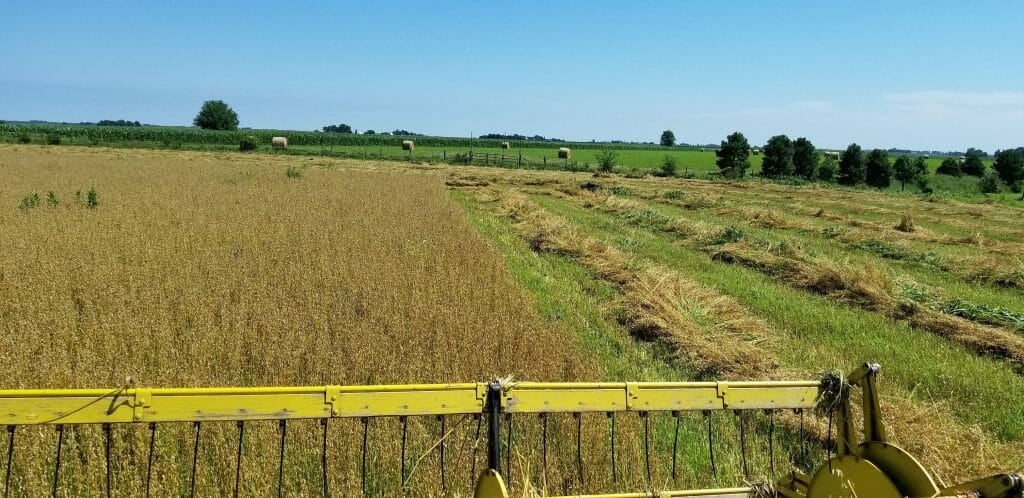Planting Oats for Seed? Understand Oat Plant Variety Protection Before You Start
Oats are the second most popular cover crop in Iowa, creating a significant market for oat seed. Though cover crop seed markets offer the advantages of a favorable price and local markets with little transport cost, growing oats for seed is more difficult than the other most popular cover crop, rye. This is due to the federal Plant Variety Protection (PVP) act that protects all seed sales in the U.S.
The PVP act governs the production and sale of seed for the purpose of ensuring the breeder is fairly compensated for their work. Under this law, the owner can decide to register the seed under a certification required or certification not required option. This then determines the steps needed to sell the seed legally. The most significant difference between oat and rye varieties is the amount of varieties protected under the PVP act. 89 varieties of oats are registered for PVP protection, while rye has only a few varieties protected by PVP (ND Dylan, Maton II, KWS Propower).

This blog debuts a new resource on oat PVP regulations, useful for identifying which varieties require certification and which don’t and how to contact the correct party to make sure you’re adhering to the law. PFI is not a legal authority on seed law and seed producers should not take this blog as a replacement for regulation or for contacting the correct regulating entity to ensure compliance. Our goal is to equip you with a basic idea of what to expect from the process and who the authority is that you will need to contact to ensure legal compliance.
Understanding PVP
When a breeder has developed a new variety of oats that has helpful or desirable features like high yield, high test weight or resistance to disease pressures, they then begin the process of publicly releasing that variety so farmers can take advantage of these traits to increase the profitability of their oat crop. In order to fund the years of research and development that go into developing a new variety – and to ensure that no one is profiting unfairly by ripping off someone else’s genetics – most breeders pursue some kind of intellectual property protections that ensure some funds from sales of that variety go towards continuing to breed lines that meet future production challenges.

Filing for PVP with the USDA is one way that breeders can provide this intellectual property protection for their varieties. In this filing process the breeder has to prove that the genetics in the variety are unique from other varieties with intellectual property protection and they also record their preferences for the conditions under which seed of the variety can be propagated and sold. If the breeder’s goal is that their variety is sold with a very high degree of confidence that the seed is genetically pure and consistent they may require seed certification which involves a field inspection, testing for genetic purity and starting with foundation seed (closest to parent genetics). If the breeder has a goal of making seed more readily available and producible at a cheaper price, then they may choose to file for PVP but no certification requirement. From the time that the PVP application is filed whatever conditions the breeder has selected are considered “in effect”.
So how do you know what varieties have what rules? The USDA’s Agriculture Marketing Service maintains a public web database of all of the PVP certificates for plant varieties that currently or have ever had PVP protection status with all of this information. Whether or not certification is required is recorded on the ST – 470 form, which are attached to the database as individual PDFs for each variety. We know sifting through more than 150 PDFs to find oat varieties that meet your goals probably wasn’t high on your to-do list of fun office tasks so we have created a spreadsheet including all 150+ oat varieties and the certification and protections there are as of 2019.
You can download the full version of the spreadsheet here
To tell whether or not the variety is certified, look under column I titled “Certified Seed” in the spreadsheet linked above. If the variety has a “certification required” in column I, this means the variety falls under the Title V option of the PVP act. To sell any variety under this option, the seller must first apply for certification with a State Certifying Agency to gain authorization to sell the seed. In most states, this agency is the Crop Improvement Association. Additionally, the producer has to plant foundation seed, undergo a field inspection and condition and test the seed at a licensed facility.

In this example, Goliath and Horsepower are listed as “certification required” this means the variety falls under the Title V option of the PVP act. Buck is listed as “certification not required,” which means it is not protected by Title V (Non-Title V). Use this spreadsheet to view all of the varieties we’ve compiled.
If the variety reads “certification not required” in column I in the excel sheet, this means it is not protected by Title V (Non-Title V). Under this option, the prospective seed producer still has to obtain authorization in order to legally sell the variety, but the other steps of certification through the crop improvement association are not required. For non-Title V PVP classification, the prospective seed producers must arrange the details of the authorization process with the owner of the variety as listed in the ST- 470 form and columns Q – V in the spreadsheet.
In some cases, the owner may require you to sign a license or other contract that could include royalty payments or fees or production stipulations for the use of the variety. Alternatively, they may not require a license at all. It is entirely up to the owner what conditions they want to set on what “authorization” means to them. It is a good idea to get your communication with the owner in writing, especially if there is no license or contract, so that you have some documentation that you contacted them and obtained permission to grow the variety for seed.

Columns Q – V provide the contact information for the owners of different varieties. Use this spreadsheet to view all of the varieties we’ve compiled.
There are a small handful of cases where varieties have been granted PVP protection, but they still can be produced without authorization from the owner or certification from the crop improvement association. The first is that even if PVP is in effect for both Title V and non-Title V PVP classification, farmers may save seed to replant on their farm the following year but cannot sell this seed for planting purposes, unless authorized.
The second case is that, similar to copyright or patents, PVP does not protect intellectual property forever and eventually the varieties enter a kind of “public domain”. PVP protection is only effective for 20 years starting from the application date. Once the PVP expires, then there are no certification or owner authorization requirements to produce seed from that variety. The current PVP status and expiration date are listed in columns J-K of the spreadsheet. For this reason, old, expired oat varieties like Jerry and Ogle have been the most popular varieties used for cover crop seed production; however, their poor resistance to disease and low productivity make these varieties risky and troublesome to produce.

A view of wind-rowed oats at Rosmann Family Farm near Harlan.
Following the trail of breadcrumbs to the correct seed production process is a lot of work, but it is imperative to do your homework and adhere to the rules. Failure to follow both types of PVP processes can lead to prosecution under federal and state law. A recent violation of PVP occurred in Iowa, where someone was intentionally selling PVP protected varieties as uncertified, unnamed seed. The state found the perpetrator liable for 2.975 million dollars.
The regulatory authority for PVP protections is the Plant Variety Protection Office, which is a division of the USDA’s Agricultural Marketing Service. Their contact information is:
USDA, AMS, S&T, Plant Variety Protection Office
1400 Independence Ave., S.W.
Rm. 4512-South Bldg., Mail Stop 0274
Washington, DC 20250-0002
Office: (202) 260-8983
Two Examples of PVP-Compliant Oat Production
To understand the certification process more extensively, we chatted with Dr. Michael McMullen, a plant breeder at North Dakota State University. Michael has been a plant breeder for over 30 years and truly enjoys the job. When asked why, he explained, “One of my favorite parts about breeding plants is watching the process. Every year we see some sort of progress and some years we also see setbacks. Just when we think we have all our ducks in a row, we have to step back and watch disease unfold. It’s very challenging but fun to see how we can approach the goal of creating the perfect seed variety.”
Michael and his team created both the Morton and HiFi oat varieties. Both varieties have PVP protection, but with the different certification options. The Morton variety falls under “certification not required” or Non-Title V while the HiFi variety falls under “certification required” or Title V. Together, we played out the process to grow these two different varieties with different PVP protections in Iowa.
HiFi Oat – Certification Required or Title V
Iowa Seed Certification Requirements (PDF)
Step 1: Contact your state’s crop improvement association and request an application form for certification. The Iowa Crop Improvement Association (ICIA) phone is 515-294-6921 and email is iowacrop@iastate.edu.
Step 2: Fill out the application form and include a certification tag or invoice showing the class, variety, grower number and lot number that represents the seed planted in each field. This will ensure the seed stock is eligible of certification. Small grain certification applications are due by May 15 to certify that year’s crop (submit application by May 15, 2020 for oats that will be harvested in July-August 2020). More information on the fees, deadlines and regulations of the application form in Iowa can be found from the Iowa Seed Certification Requirements Handbook.
Step 3: After completing the application, a certifier from ICIA will conduct one or more field inspections on the field of interest while the crop is growing in the field. If the inspection shows the field is not adequate to determine genetic identity and purity, ICIA has the right to reject the field.
Step 4: After harvest, a certified seed agency has to perform germination tests and seed analyses to confirm the seed meets necessary genetic standards. In Iowa, the germination rate, purity analysis and noxious weed examination is also required on the label. Only a registered seed technologist can generate this information and label.
Step 5: Lastly, when selling certified seed, a certification tag must be present on the bag. The tag needs to include identification of the seed by crop, variety, class, lot number, application number and a statement ensuring the certification requirements are met.
Step 6: Ensure you meet state requirements for seed labels and licenses to sell seed – see regulation of seed sales beyond intellectual property below.
Morton Oat – Certification Not Required or Non-Title V
Step 1: Contact variety owner as listed in our spreadsheet resource. For Morton, we contacted NDSU Research Foundation.
Step 2: Get agreement in writing with NDSU Research Foundation that covers production and labelling requirements. Jolylnne Tschetter, executive director of the NDSU Research Foundation provided us with this written response: “Typically, the foundation would grant authorization through a non-exclusive variety license agreement but in the case of Morton oat, the foundation has not been enforcing PVP rights in the United States since the variety was released in 2001. No license agreement is needed to grow Morton oats and there are no research fees or royalties on seed produced of this variety.”
Step 3: Grow and harvest Morton oats.
Step 4: Ensure you meet state requirements for seed labels and licenses to sell seed – see regulation of seed sales beyond intellectual property below.
Patents on Oat Varieties
Oat breeders also have the option of applying for a patent or other intellectual property rights on their genetic varieties. As with “non-Title V” oats, in these cases, a prospective seed grower must contact the owner or patent holder to determine the terms under which seed can be produced. Unfortunately, there is no easy way to look up oat patents (though if you’re determined, you can try here). However, if a variety owner applied for PVP and a patent, the application requires the owner to disclose the patent application number on their PVP application form. In the PVP spreadsheet resource discussed above, we have captured varieties that have both PVP and a patent and provided patent information in those cases in columns O-P in the spreadsheet resource.
Regulation of Seed Sales Beyond Intellectual Property
Separate from intellectual property protections like PVP or patents, most states also have their own laws governing seed sales. For example, in Iowa, all seed requires a seed label with the germination rate, a purity analysis, and a noxious weed examination. Any registered seed technologist can create this label. You may also need a license from the state in order to sell seed. This IDALS fact sheet is a good summary of Iowa seed law. Generally, the state department of agriculture is the keeper and enforcer of these rules, in Iowa the appropriate contact is:
Robin Pruisner, Iowa Seed Control Official Iowa Department of Agriculture & Land Stewardship – Seed Control Official
(515) 725-1470 | Robin.Pruisner@IowaAgriculture.gov
Overall, the benefit of following these rules and regulations is selling a seed variety everyone can trust. For Michael McMullen, a seed you can trust “doesn’t cost; it pays!” We hope this new tool eliminates confusion and helps growers understand the steps required to grow and sell different oat varieties legally.

